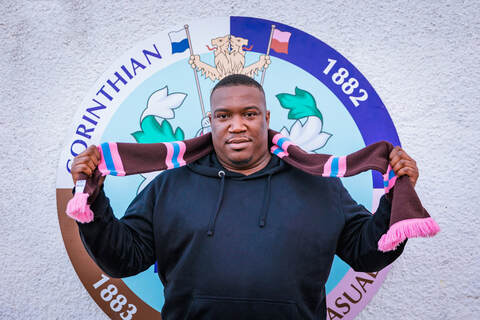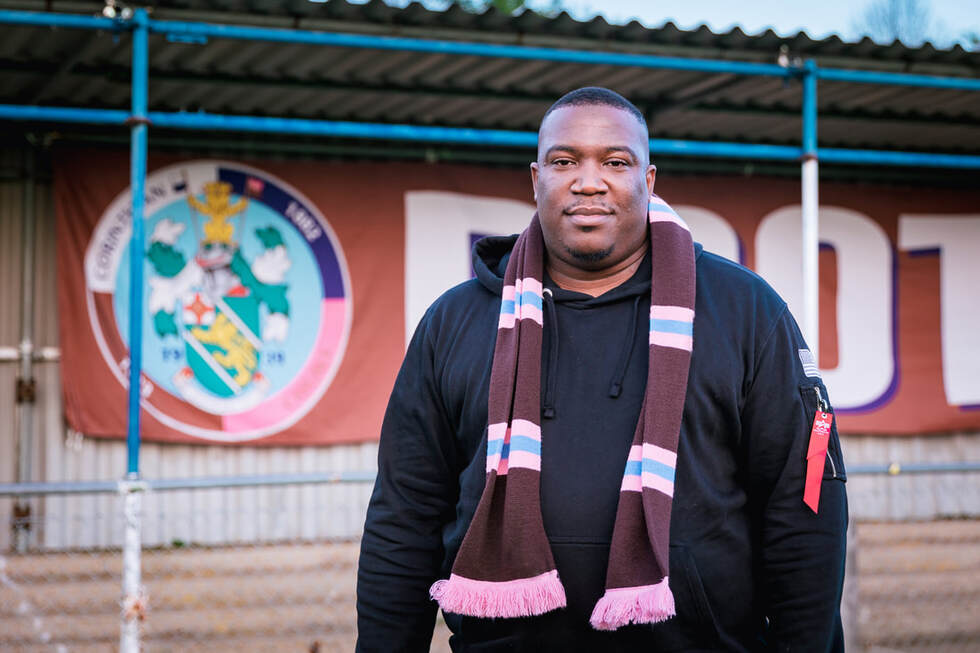Corinthian-Casuals have a new manager. Justin Fevrier was appointed to the role on Saturday and sat down with us for his first interview shortly afterwards. Here’s what he had to say about his approach, his background and his fascination with this historic club…
Firstly, I’m honoured. This is a massive club with lots of history. I’ve often come across the club in the past having played Isthmian League football throughout my career, and I associate it with good football, talented players and a great fan base. I’m looking forward to the challenge and I’m just glad that I’m here now. I know it’s an amateur club, but it’s well run and the fact that they’re at this level is an indication of how good they’ve been. The club has been consistently at this level for a few years now. I know of James Bracken quite well from the circuit and he has done an amazing job here. It’s a great club. I loved the documentary on the club and the trip to Brazil.
We’re in a difficult position this season, bottom of the table and on a long run of defeats. What will be your first steps towards turning things around?
The first objective is to get off the foot of the table, which we can do on Saturday, and then take it game by game from there. We know who we’ve got coming up in the next five games and we have to be realistic with our approach, but where we can we will go after the points and look to turn things around. But the objective is firstly to get off the foot of the table, then the next one would be to get out of the bottom four, and to climb the table if we can do that. We’ll go step by step, game by game.
How would you describe your approach with the players?
I’m quite laid back, but I am also passionate. If you were to ask players about me, they would say I’m a man manager, I care about my players and treat them as people first, because they are. But when it’s game time, I am competitive, I am quite firm and I can get a tune out of any team, so expect the boys to be well-drilled and to be ready to run through walls for us.
You have psychology qualifications as well. Is that an important part of the way you go about managing a team?
Yeah, I’m very big on positivity and energy and I’ll be using that with the boys, to make sure that we can get every marginal gain towards getting the results that we need.

I would say I had a mediocre career – I wasn’t an outstanding player. I was a centre-half: dominant, on the front foot, aggressive and won my headers – not the best with my feet, but honest. I started off at Staines Town academy, and they fielded loads of future professional footballers at that time. They were trailblazers – they had people like Robin Shroot, Lyle Taylor, who is at Nottingham Forest now, Dom Dwyer, who plays in MLS and is a USA international, and Jermaine McGlashan. I went on to the fringes of the first team, via the reserves route, and then moved to Dulwich Hamlet, a local club for me. Then I played for Croydon Athletic and a few other teams, the height of which was Welling United in what is now the National League South. I spent that summer getting into the best nick I could and then went there, but it didn’t quite pan out.
At that time, I was ready to call time on playing. I had a nasty injury outside of football which made it hard for me to stay fit, and I was only 22 or 23, so quite young. However, just before that I had two international call-ups for Dominica, which probably represents the pinnacle of my football career. I played against Barbados in World Cup qualifiers in 2008/09. To get a letter out of the blue asking you to represent a country is quite a big thing. We had a few other English-based players in the side at that time and we were the first overseas players to represent them. That was a great experience, one that I cherish and which has helped to shape me into the person I am now.
You had an experience in a Corinthian-Casuals shirt as well, right?
During the time when I was floating around teams, I popped up at Corinthian-Casuals. There were a few players that I knew here at the time: Kane Sargent and Carl Wilson-Dennis. So I came down and I was asked to play in a reserve game, so they could see me play. I have no recollection of who we played against that game, but I do remember that I played alongside a guy called Sacha N’baye, who was a centre-half who has now gone on to be a supermodel in Fashion Week!
A bit more glamorous than Casuals reserves, then!
Yeah, much more glamorous! He’s gone on to model with Naomi Campbell and stuff!
Considering you wound down your playing career very young, how did your coaching career start?
I went to Banstead Athletic in 2013 when a gentleman called Andy Tucker, who was at Dulwich Hamlet as their secretary, got a job there. He asked me to come down and help him out, so I went there as a player-coach. When he left, I stayed on to finish the season, but then I said, “I’m done,” and I retired. I went into coaching then. I worked at Millwall in the Community, doing some casual coaching work, and it built from there.
How do you like your teams to play?
You’ll see a common theme – on the front foot, winning challenges, and wanting the ball back, but also expect to see good use of the football on the grass as we look to exploit teams with our talented young players.

This ties in with psychology stuff that we spoke about, so it’s about reminding them that there are many games left in the season and explaining how many points they need to get out of the position we are in. When you break that down for them, it doesn’t look as big a task as it may appear. At the moment, we’re on five points and eight points would take us off the bottom of the table, so that’s one win. Then the next step is another win – six points and you’re up another position in the table. You just break it down for the players in that sense and give them the belief they need, through training methods and man management. As long as they buy into the plan and the environment we create, we should be fine.
Will you be bringing your own backroom staff in?
Yes, I will. Richard Orlu will be coming in as my assistant. He’s an intelligent guy, he’s played about 200 games at National League level, with Dover, Woking, Welling and Farnborough, and was captain at most of those clubs. He has a lot of experience at the higher end of non-league football, he’s someone I trust, and he gives sound counsel. Then there’s Adam Thompson, who was a K’s and Staines Town legend. He played centre-half as well and was someone I looked up to as a player. He will be coming on board as another assistant. We’ll also be looking to add a goalkeeper coach, another first-team coach and potentially someone on the analysis side as well.
How important is performance analysis for you, because coaches vary on that at this level?
Yeah, it’s huge. Fortunately, I’ve had the resources to use video analysis in previous roles and I will be doing the same here. I’m big on detail and that’s another thing that might help change or shape the dressing room – if they know how they’re performing and what they need to do to get better results. That can come from data.
Do you mean video sessions and that sort of thing?
Video sessions, so going through the game from the previous week before training, or building the session around the game we’re going to be playing that weekend. A team will go to watch opponents and put together a scouting report on them, then share it with the group. That work is really important.
You are coming into the role in mid-season and have an immediate focus on the first team’s situation, but how much are you looking forward to getting to know the wider club, our supporters, our many teams and our community?
Very much so. I’m not just the manager of the first team, I’m going to be fully involved in the wider project, whether it be the youth section, the supporters and various other areas of the club. I’d like to do a meet and greet with the supporters, to meet everyone and to explain my objectives for the club. I’ll be around after games, in the bar, so come and meet me and speak to me. I’m very approachable and I’m really looking forward to meeting the fans.
You’ve touched on our history already, and a lot of Corinthian traditions are woven into the fabric of the place. Are you looking forward to managing such a unique club?
Yes. When I was speaking to Brian and some of the other committee members yesterday, they went into detail on how unique the club is – the fact that it’s an amateur club and has wider links to South America. I think it’s amazing and being one of the founding influences at Corinthians. The fact that there is talk of change… I don’t think you should change anything – I think you should keep it the same. That’s what makes it unique, and, at this level, other teams come here and understand they are walking into this unique club. I think that’s amazing; any player joining the club will need to embrace it, as will I. I just hope it embraces me back.
Justin Fevrier was talking to Dominic Bliss
